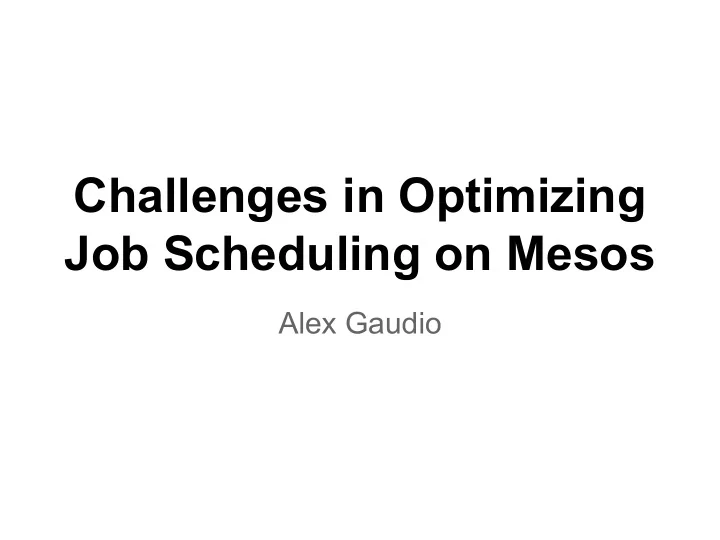

How Mesos does Job Scheduling Mesos Master Frameworks Accepted offers result in tasks that do useful work. Mesos Slaves
3 Types of Scheduling Architectures (aka 3 Types of Distributed Kernels) Mesos has a two-level architecture.
3 Types of Scheduling Architectures Mesos Master Mesos Frameworks (manage resource and framework (manage task state) state) from the Google Omega Whitepaper
3 Types of Scheduling Architectures from the Google Omega Whitepaper
3 Types of Scheduling Architectures (aka 3 Types of Distributed Kernels) Goal
3 Types of Scheduling Architectures (aka 3 Types of Distributed Kernels)
3 Types of Scheduling Architectures (aka 3 Types of Distributed Kernels) Borg (Google)
Remainder of this talk... Point out weaknesses with Mesos that 1. Prevent it from being a shared state kernel. 2. Can make Mesos challenging to use.
Remainder of this talk... 1. Optimistic Vs Pessimistic Offers 2. DRF Algorithm and Framework Sorters 3. Missing APIs / Enhancements
Optimistic Vs Pessimistic Offers We Trust Everyone!
Optimistic Vs Pessimistic Offers Protect my spot Everyone from promised thiefs! not to take my spot
Optimistic Vs Pessimistic Offers
Optimistic Vs Pessimistic Offers ● 2 frameworks sharing the same resources is not safe
Optimistic Vs Pessimistic Offers ● 2 frameworks sharing the same resources is not safe ● A chunk of resources is only offered to a single framework scheduler at a time.
Why is this a problem? When a Framework receives resource offers, it has 2 options: Hold onto the Make an offer forever in immediate a state of decision indecision
Why is this a problem? When a Framework receives resource offers, it has 2 options: Hold onto the Make an offer forever in immediate a state of decision indecision
Why is this a problem? Under-utilization If the framework holds the offer forever, those resources can’t be used. … or eaten!
Why is this a problem? Under-utilization Can be hard to schedule large tasks
Why is this a problem? Gaming the System If it’s hard to schedule large tasks, frameworks might hold onto tons of offers until it can schedule its huge task.
Why is this a problem? Gaming the System: One could create many instances of a framework to trick Mesos to let it hoard more offers!
Workarounds / Solutions ● --offer_timeout Set short timeouts to penalize slow frameworks ● MESOS-1607 : Wait for optimistic offers! ○ Submit one offer to multiple frameworks, but rescind the offer when necessary. ○ Encourages more sophisticated allocation algorithms
Remainder of this talk... 1. Optimistic Vs Pessimistic Offers 2. DRF Algorithm and Framework Sorter 3. Missing APIs / Enhancements
DRF and Framework Sorter
DRF and Framework Sorter Mesos Master must choose which Frameworks to give offers to first.
Recommend
More recommend